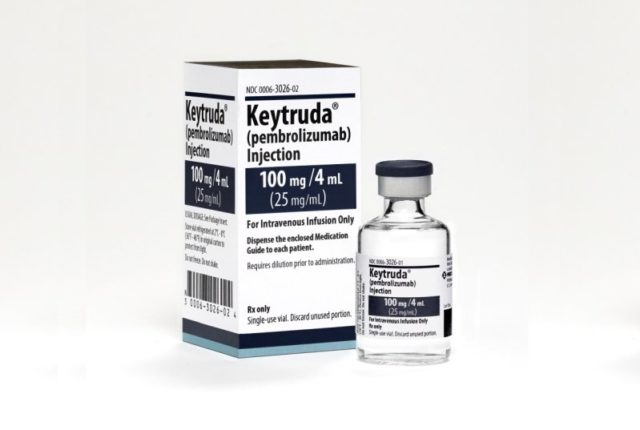
Merck has bagged another early cancer nod for Keytruda, and this one could be worth more than $1 billion in peak sales.
The FDA has approved Keytruda for treating patients with early renal cell carcinoma—the most common type of kidney cancer—at high or intermediate-high risk of recurrence after surgery, Merck said Thursday. The PD-1 inhibitor is the first immunotherapy to enter the field.
Keytruda could collect about $1.2 billion in peak sales from this adjuvant kidney cancer setting, which could mean $3.4 billion for all PD-1/L1 inhibitors, SVB Leerink analyst Daina Graybosch, Ph.D., recently told Fierce Pharma.
Before Keytruda’s arrival, Pfizer’s kinase inhibitor Sutent had been approved since 2017 as an adjuvant therapy to prevent kidney cancer from coming back in high-risk patients. But the treatment hasn’t become standard of care because of its limited efficacy and a high rate of side effects.
RELATED: ASCO: Merck’s Keytruda targets Pfizer’s shaky Sutent post-surgery use in kidney cancer
In the phase 3 KEYNOTE-564 trial, Keytruda cut the risk of disease recurrence or death by 32% over placebo when used as an adjuvant therapy for intermediate-high or high-risk kidney cancer, according to data unveiled at this year’s American Society of Clinical Oncology virtual meeting.
But as Graybosch pointed out in a September note to clients, the ideal patient population for this Keytruda use remains under debate. Among patients at the M0 stage, which means no distant cancer spread, adjuvant Keytruda only conferred a relatively small benefit in disease-free survival, with a risk reduction of 26%. By contrast, the M1 population with completed resected metastases enjoyed a 71% risk reduction from Keytruda.
Given that M0 patients already have a low risk of recurrence following surgical removal of kidney, prolonged adjuvant anti-PD-1 treatment, thanks to its toxicity, may not be a good treatment strategy in doctors’ eyes, Graybosch added.
The latest adjuvant go-ahead follows an August nod for Keytruda in combination with the Eisai-partnered Lenvima in newly diagnosed advanced kidney cancer. As most advanced or metastatic cancer fields become saturated, current PD-1/L1 players are looking more at early-stage disease settings, where treatments are adopted around surgery.
For adjuvant kidney cancer, Keytruda could soon have company from Roche’s Tecentriq; the phase 3 IMmotion010 trial of the PD-L1 inhibitor bears a primary completion date in January 2022.
Last month, Tecentriq became the first in the PD-1/L1 class to enter post-surgery non-small cell lung cancer with an FDA approval in stage II to IIIA, PD-L1-positive patients. But the drug’s lackluster performance in patients with PD-L1 expression between 1% and 49% also raised a few eyebrows.
Besides, doctors appear on the fence over the idea of adjuvant PD-1/L1 treatment for lung cancer as they wait for readouts from other drugs and more mature data on patient survival. Keytruda’s own adjuvant NSCLC trial, dubbed Keynote-091, is expected to read out next year.






